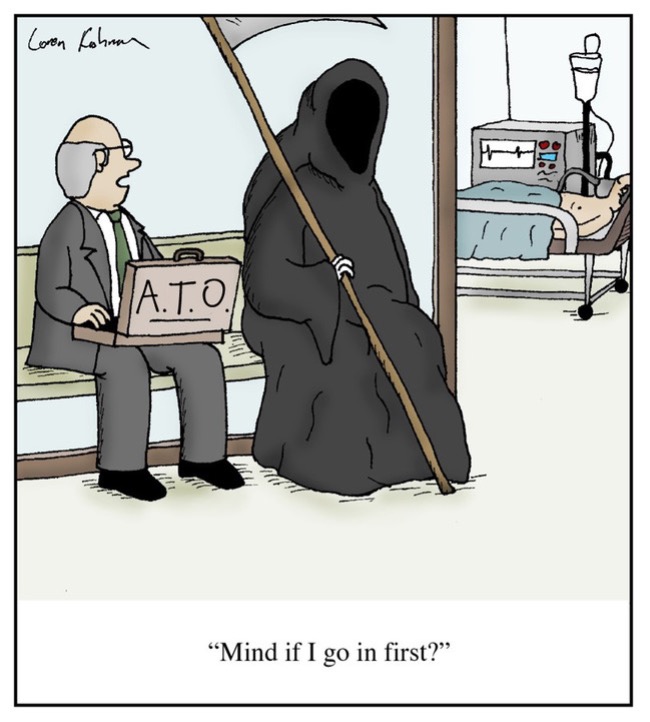
Technically we do not have a death tax but there are lots of ways that death can be a windfall for the ATO. This blog looks at some of those traps and what you can do to avoid them. These traps can catch average Mum and Dad taxpayers who are not in a position to pay advisors to protect their estate.
Here is a list of “death taxes” that the average person should be aware of and the actions you can take to minimise the impact.
17% Tax on Superannuation – One of Noel Whittaker’s favourite bug bears. If you die and leave you superannuation to anyone other than your spouse or children under 18, the taxable portion of the payment will be taxable income to them and while it will come with a tax offset, it could push them into the maximum tax bracket. At worst costing them an extra 17% over the top of the offset. A simple recontribution strategy before you reach 75 years of age can remove the taxable component from your superannuation. Lots of tricks and traps though, make sure you get advice. If you are too old to recontribute to superannuation and you think that your will is unlikely to be contested consider putting a binding nomination in place that your superannuation be paid to the estate first, if the estate is likely to be in a lower tax bracket than your beneficiaries. Also the estate will not have to pay the 2% Medicare Levy.
Living Overseas – If you have been living overseas for more than 6 years when you die but still own your home in Australia, all of your main residence exemption is lost, right back to the time you first purchased the property and there is no reset of the cost base at date of death. So when your estate sells the property all of the capital gain will be taxable and the 50% CGT discount will not apply for any period you were a non resident after 8th May 2012.
Beneficiary Living Overseas – If you leave shares etc or an overseas property to a non resident beneficiary it will trigger a CGT event as if the asset had been sold. None of the rollover that is available if assets are transferred to resident beneficiaries can apply. The asset is treated as if you sold it just before you died, CGT will be payable in your date of death return.
Not Keeping Records – Put yourself in your executors or beneficiary’s’ shoes. How are they going to work out what assets you purchased before 1985 let alone prove it, if it is something other than real estate? How are they going to know if a property has always been covered by your main residence exemption? If it is not then where do they find the documents to minimise the capital gain? Basically no records, no cost base, CGT on the whole sale proceeds and the ATO becomes a major beneficiary of your estate!
Want to avoid the death tax, get your affairs in order. At least start with a carefully structured will, proper advice and collect together all your records in a coherent way. The Getting Your Affairs In Order Made Simple package provides you with the spreadsheets you need to keep the right records, including full instructions on the information required. There is also a section for other important information and Noel Whittaker’s checklist.
https://www.bantacs.com.au/shop-2/getting-your-affairs-in-order-made-simple/
 Julia's Blog
Julia's Blog